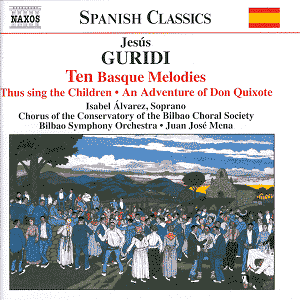The Ten Basque Melodies is regarded as
Guridi’s masterpiece. It is more than an agreeable orchestral
setting of folk tunes, but could be heard as a ten movement suite
or symphony, sometimes reminiscent of Rodrigo in its eastern Iberian
gaiety and lyrical tenderness. In other ways it sounds like one
of the Respighi Ancient Airs and Dances Suites, with the
brief movements, the characteristic modal texture of the tunes
which brings a feeling of nostalgia, and the brilliant orchestration.
At moments we hear the same sense of oppressed nationalist feeling
that is found in Smetana and early Sibelius.
Guridi was choirmaster of the Choral Society
before he was appointed organ teacher at the Madrid Conservatory,
noted for his skill in improvisation. Later he became director
of the Conservatory and was always very interested in classical
themes and structures and did not limit himself to Basque cultural
sources or sounds. In a Phoenician Boat is based on the
story of Telemachus, son of Odysseus. Here we have again the typical
brilliant orchestration, intricate counterpoint, martial fanfares
and rhythms and classical dramatic structure, although the opening
passages are more reminiscent of Rachmaninov’s Isle of the
Dead.
What the Boys Are Singing is something
of a chamber opera for children’s chorus, a brief scene where
the children pause in their games to sing about a playmate who
died, but then they resume their joyful playing. Besides the influences
mentioned above we hear a little Bizet here and there. The notes
contain the text and translation only of this work, but texts
are not included for any of the other works in any language.
Don Quixote’s Adventure is a tone
poem with a vivid sense of program although no scenario is given,
and was written at a time when Guridi was composing opera. The
sound is again somewhere between Smetana and Respighi, with a
strong sense of operatic stage drama. One can almost see singing
characters moving on stage, and one of the big themes is the inversion
of the Hussite hymn from Smetana’s Blaník.
The Cock Sings in the Morning is a wistful,
lyrical soprano song accompanied by quiet strings and winds, with
no attempt at musical depiction of chickens. With no text, I had
no clue as to what the cock had on his mind.
I live in an area with a significant Basque minority,
and I am surprised not to see any use of the Basque language in
this release with its appeal to Basque cultural identity.
Paul Shoemaker
